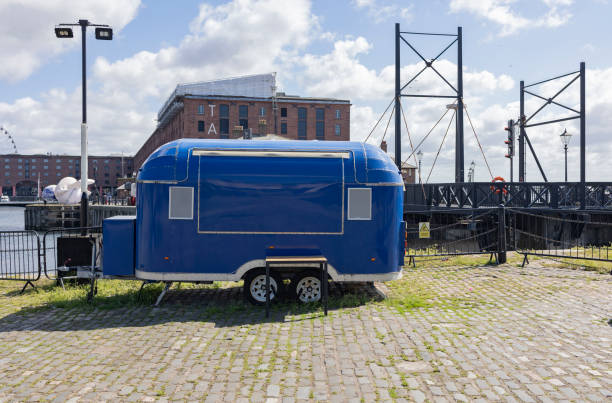Exploring the Materials Revolution in Mobile Kitchens
Ever walked past a food trailer and thought, wow, this doesn’t look like the old greasy carts I remember? Yeah,...

Ever walked past a food trailer and thought, wow, this doesn’t look like the old greasy carts I remember? Yeah, same here. Food trailers have come a long way — and not just with fancy logos or neon paint jobs. The real magic is in the materials. What they’re made of is quietly changing the whole mobile kitchen game, and the best food trailer manufacturers are leading the charge with smarter, safer, and more durable builds.
If you’re dreaming of joining the food truck crowd, or maybe scanning listings for business trailers for sale, stick with me. This isn’t just “boring construction talk.” The stuff your trailer is built from could save you money, headaches, and even set you apart in a crowded market.
Heavy Steel Days Are Gone
Let’s rewind. Not too long ago, trailers were like miniature battleships — thick steel walls, heavy floors, and not much else. Strong? Sure. But you needed a monster truck to tow them, and your gas bill… ouch.
Now? Different story. The best food trailer manufacturers are swapping that old-school steel for lighter options like aluminum frames and composite panels. Same strength, way less weight. A buddy of mine runs a taco stand and told me after switching trailers, “It’s like towing air.” That’s not an exaggeration — his fuel costs dropped, and so did the stress on his truck.
Cleanliness: The Silent Sales Pitch
Here’s a truth nobody likes to admit: customers judge how clean your kitchen looks almost as much as how your food tastes.
Modern trailers often come with wall and counter surfaces that resist grease, stains, and even bacteria. Imagine spending less time scrubbing and more time serving. That’s not just convenience, it’s peace of mind.
And honestly, walking up to a sparkling, fresh-smelling trailer just feels better. Nobody wants to order fries from a place that looks like it survived a grease fire.
The Heat Problem (And The Fix)
Ever tried cooking in a metal box during July? It’s like standing in an oven while trying to run a business. Not exactly ideal.
That’s why insulation has become a big deal. Foam layers, reflective coatings, even roofs that bounce sunlight instead of trapping it — these are now pretty standard. Less heat inside means you’re not burning cash running fans and coolers nonstop. Some companies are even testing solar panels up top. Free energy to power your lights or fans? Yes, please.
One Size Doesn’t Fit All
A coffee trailer doesn’t need the same setup as a BBQ pit. And a smoothie bar? Totally different flow. In the past, customizing was expensive and painful. You basically had to rip out walls just to move a fridge.
But with modular panels and flexible layouts, changing things is easier. The best builders know this, and they’ll work with you to set up a trailer that actually matches your menu. If you’re scrolling through business trailers for sale, pay attention to whether customization is offered. It makes a huge difference later.
Eco-Friendly Isn’t Just Trendy
This one’s sneaky important. Customers today love supporting businesses that look eco-conscious. Recycled aluminum, bamboo finishes, low-toxin paints — these aren’t just materials, they’re marketing tools.
I saw a gelato trailer wrapped in bamboo paneling once. People were lining up just to snap selfies. Did the gelato taste better? Probably not. But the vibe was irresistible.
Built to Last (Without the Rust)
Rain, heat, snow, salty air — trailers face it all. Old builds rusted out fast or warped under the sun. That’s money out of your pocket when repairs hit mid-season.
Now you’ll find powder-coated metals, UV-resistant paints, sealed seams. These details might sound boring on paper, but they keep you open for business instead of waiting for repairs. Durability equals reliability. And reliability equals trust with your customers.
Looks Matter More Than We Admit
Food is about taste, sure. But trailers today? They’re also part of the show. Smooth finishes, wood-grain textures, bright wraps — materials make trailers pop.
Your mobile kitchen is your storefront. People see it before they even smell the food. So why not make it part of your brand story? You’d be surprised how much a polished, stylish trailer pulls customers in.
Questions Worth Asking
If you’re out there shopping for a trailer, don’t just ask “How much?” Ask about the bones of it. Here’s a cheat sheet:
- What’s the frame made of? Steel? Aluminum?
- How’s it insulated?
- What kind of surfaces are inside? Easy to clean?
- Any weatherproofing on the outside?
- Can the layout change later?
If a builder dodges these questions, that’s a red flag. The best food trailer manufacturers are proud of their material choices because they know it’s what sets them apart.
What’s Next?
It feels like we’re only scratching the surface. Some companies are already dabbling in 3D printing trailer parts. Others are testing smart materials that self-heal scratches or adjust to temperature changes. Sounds wild, right? But ten years ago, solar panels on food trailers would’ve sounded wild too.
Wrapping It Up
Your food trailer isn’t just four wheels and a fryer. It’s your livelihood. It’s your brand. Heck, for some people, it’s their entire dream rolled down the street.
So when you’re browsing those business trailers for sale, don’t just look at the paint job or the price tag. Ask about the materials. Because that’s where the real revolution is happening.
And if you land one built by the best? Well, you’re already halfway to success before you even fire up the grill.



